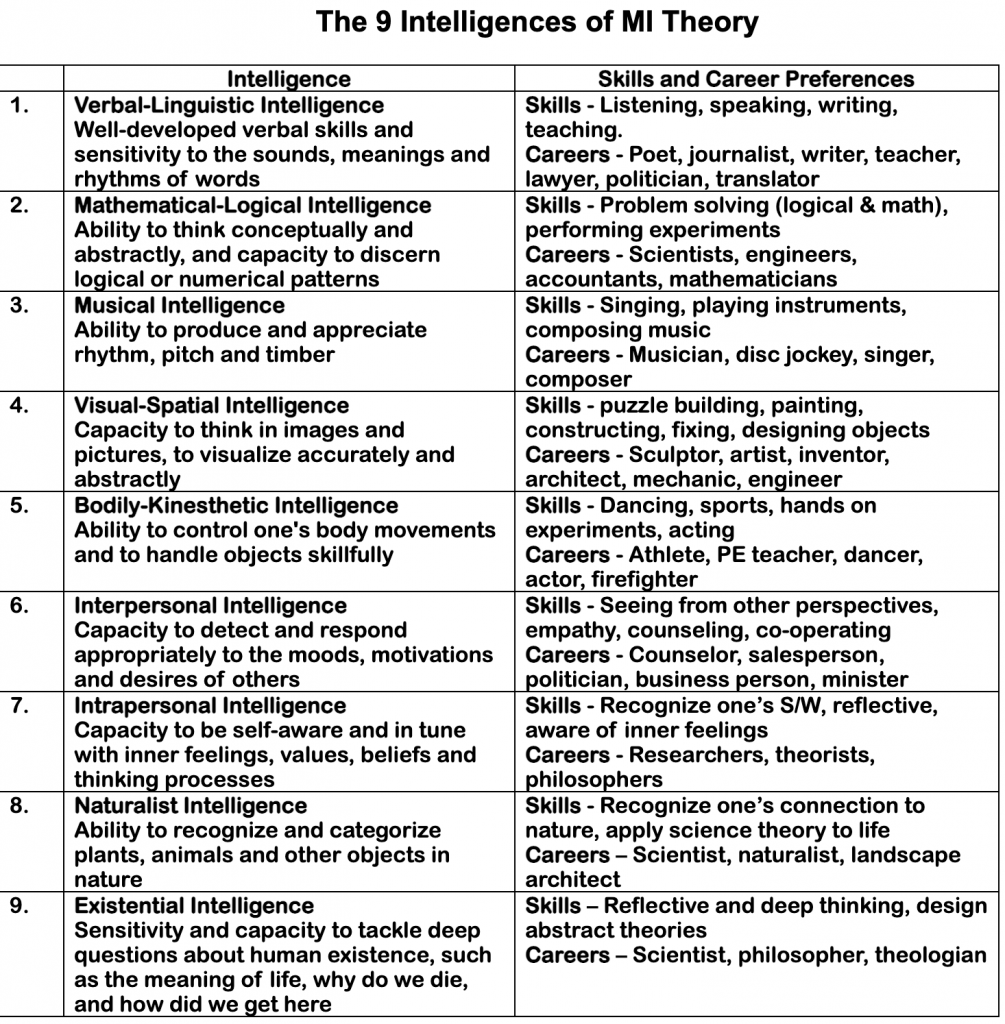Howard Gardner’s Theory of Multiple Intelligences: A Comprehensive Overview
Abstract:
This scholarly article delves into the multifaceted theory of Multiple Intelligences (MI) proposed by the distinguished American psychologist Howard Gardner. Gardner’s theory posits that human intelligence is not a monolithic entity but a complex interplay of nine distinct intelligences. Each intelligence represents a unique cognitive skill or strength that individuals can possess to varying degrees. This article explores the intricacies of Gardner’s MI theory and its implications for understanding human capabilities. It focuses on the significance of Choitonyo, or love for humanism, as essential to realizing one’s full humanity.
Introduction:
Howard Gardner’s theory of Multiple Intelligences has been1 significantly contributed to psychology and education. It challenges the conventional notion that intelligence can be measured and categorized through a single, unitary concept. Instead, Gardner’s theory emphasizes the diversity of human cognitive abilities, suggesting that each person possesses a unique blend of these intelligences.
Understanding Gardner’s Nine Intelligences:
Gardner’s theory identifies nine distinct intelligences, each characterizing a specific cognitive strength. These intelligences are:
1. Verbal-Linguistic Intelligence
2. Logical-Mathematical Intelligence
3. Musical Intelligence
4. Visual-Spatial Intelligence
5. Bodily-Kinesthetic Intelligence
6. Interpersonal Intelligence
7. Intrapersonal Intelligence
8. Naturalist Intelligence
9. Existential Intelligence
As mentioned in the introduction, the poet typically exemplifies verbal-linguistic intelligence and may possess other intelligence based on their unique skills and experiences. For example, poets skilled in singing or playing musical instruments may also exhibit Musical Intelligence. Additionally, poets with a penchant for visualizing their words or themes may have Visual-Spatial Intelligence.
The Human Element: Choitonyo (Love for Humanism):
While Gardner’s theory provides a comprehensive framework for understanding cognitive diversity, it is essential to recognize that intelligence alone does not define our humanity. Gardner’s theory does not explicitly address human existence’s emotional and ethical dimensions. That is why Choitonyo, or love for humanism, becomes relevant.
Choitonyo represents the capacity for empathy, compassion, and a deep appreciation for the shared human experience. It transcends the boundaries of race, color, or any specific intelligence. Choitonyo underscores the fundamental idea that, regardless of one’s cognitive strengths or weaknesses, the essence of being truly human is in our ability to connect with and understand others, recognize the dignity of every individual, and work towards a more humane and compassionate world.
Conclusion:
Howard Gardner’s theory of Multiple Intelligences has expanded our understanding of human cognition, emphasizing the diversity of intellectual capabilities. Like individuals from various walks of life, poets can possess multiple intelligences. However, it is crucial to remember that the accurate measure of humanity lies not just in cognitive strengths but in the presence of Choitonyo – the love for humanism. This concept reminds us that our collective journey toward a more empathetic, compassionate, and humane world defines our shared humanity regardless of our strengths and weaknesses. Gardner’s theory, coupled with the wisdom of Choitonyo, provides a holistic framework for appreciating the complex tapestry of human existence.
Authors note: The text is likely to be understood by college graduates but may be challenging for many to read.
Source:
- Frames of Mind: The Theory of Multiple Intelligences – Massive Bookshop. https://massivebookshop.com/products/9780465024339
- Learning styles and Edtech solutions – eLearningworld. https://elearningworld.eu/learning-styles-and-edtech-solutions/

PODCAST
